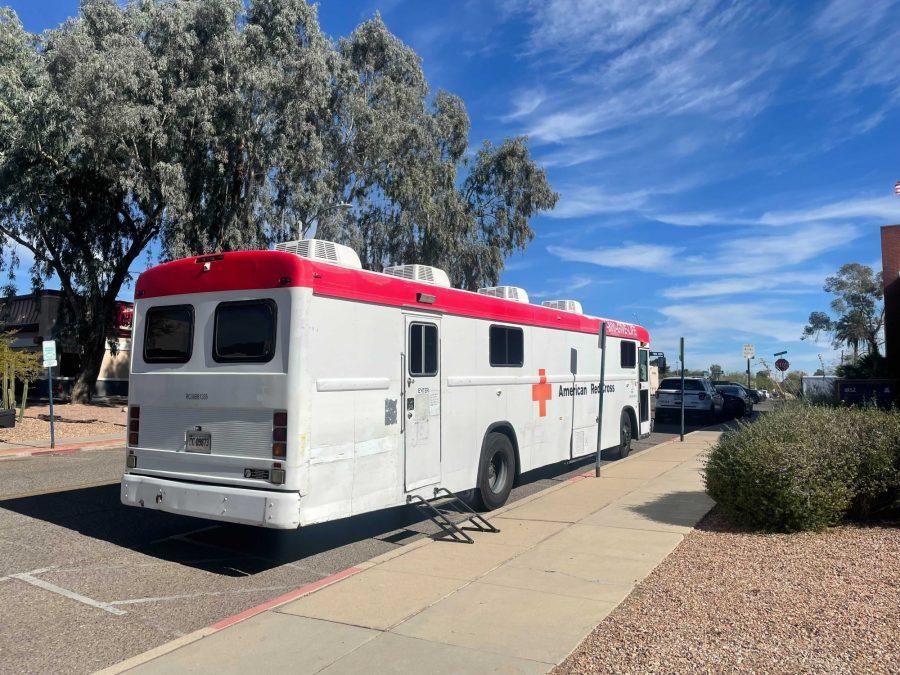On Wednesday, Jan. 25, 27 people were signed up to “save lives” at the University of Arizona Police Department’s blood drive, as Maria Proytcheva, a UA professor of pathology and pediatrics and the medical director at Banner — University Medical Center Tucson laboratories, put it.
In honor of January being the National Blood Donor Month, major nonprofit blood service providers such as Vitalant and the American Red Cross have made appeals asking anyone who is able to donate blood to do so, stating that there is a national blood donation crisis. In return, donors will be entered to win in several different raffles from the nonprofits.
The need for blood donors is evident in the efforts of two of the largest blood donation nonprofits. All blood, platelet and plasma donors who sign up online and donate to Vitalant up until Jan. 31 will be entered to win a $5,000 prepaid gift card and will be entered to win tickets to the Renaissance festival.
Additionally, the American Red Cross is partnering with the NFL, so all donors who donate up until Jan. 31 will be entered to win two tickets to Super Bowl LVI in L.A.
“With a daily need of 600 donors to meet the needs of 62 Arizona hospitals, we need people of all blood types,” said Sue Thew, a representative for Vitalant. “But it is especially critical for type-O people to give blood because they have the universal blood type that can be used in emergencies and traumas.”
The American Red Cross estimates that a 62% drop in college and high school blood drives due to the pandemic are also contributing to the blood crisis. Previously, they made up about 25% of donors in 2019 but only about 10% during the pandemic, according to their website.
Jesus Aguilar, a police officer at the UAPD, said they hold blood drives in front of the UAPD building on 1852 E. First St. every two to three months and notify students via their social media pages in advance.
Their goal, Aguilar said, is usually 15 donations. But on Wednesday, 27 people had signed up to donate blood.
Elena Matias, a senior majoring in sociology and care and health and society was one of the 27 donors waiting outside of the bloodmobile by the UAPD location. She has been a donor for a couple of years and at the swipe of a screen on the American Red Cross app, she is able to check where she can donate blood.
“I just like being able to do good things, and I feel like this is kind of an easy way to give back,” Matias said. “Everyone that is able to should. It’s really easy, it doesn’t take a lot of time out of your day. A lot of them are really good at what they do, so it’s not painful and you get a free snack after.”
RELATED: Faculty, staff union voice concerns about UA’s handling of Omicron spike
In Arizona, blood donations have hit a two-year record low, down by one-third of its usual rate, according to Thew. She also mentioned that employees and possible donors contracting COVID-19 are behind some of the blood shortage.
“We always have seasonal shortages around this time of year because the winter holiday season is our lowest time of year for blood donations,” Thew said. “But this year was even more severe. Up until we announced the critical shortage, our appointments were much lower than they were traditionally.”
Many hospitals in Tucson and around the nation have had to cancel elective surgeries such as hip or knee replacements because of the blood shortage, according to Proytcheva.
“We at Banner UMC are very proactive and so far we are on the borderline — we haven’t canceled surgeries and we are not seeing the horrible situation where we need to transfer to decide which patient will be transfused,” Proytcheva said. “If you have three candidates, how do you determine whose life is more important and whose is less important?”
RELATED: Cases of Omicron COVID-19 variant identified at University of Arizona
Of course that doesn’t count the patients who need blood transfusions after surgeries, trauma patients who often require five to six times the amount of their normal blood volume and patients who depend on blood transfusions as a treatment for certain conditions.
“If you’ve waited until someone you know is dying in a hospital bed needing a transfusion, you’ve waited too long,” Thew said.
Blood donations are bound to strict regulations for donor eligibility and the processing of blood products.
“Only in the movies, you see, they take the blood and immediately transfuse it. It doesn’t work like that,” Proytcheva said.
Banner is also holding a blood drive in February in partnership with the American Red Cross. Details for the drive will be released in the coming weeks.
“[This] literally saves lives. I mean, sometimes we say ‘Oh save lives, U.S.A. flag,’ but it may not be exactly the truth — but with the blood transfusions, it is,” Proytcheva said. “It’s a life and death situation, and I hope that more people will go and volunteer and donate blood.”
Follow Susan Barnett on Twitter









